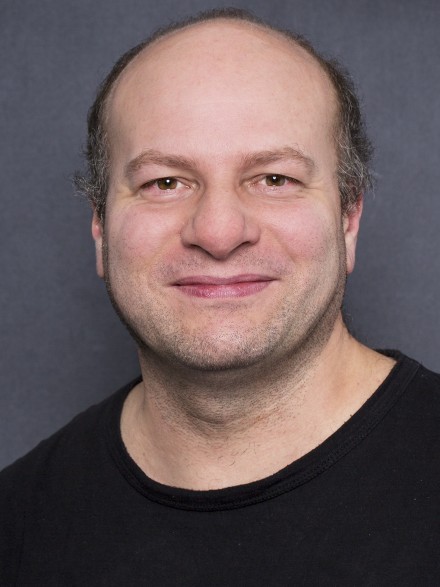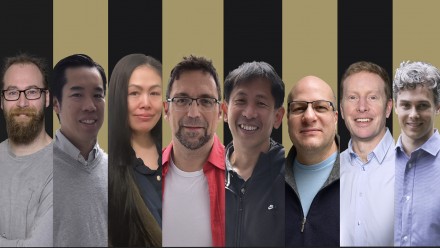Dr Gaétan Burgio

Contacts
Dr Burgio was born in France and completed his education in Paris. He graduated from the Faculty of Medicine Xavier Bichat in Paris in 2002 with a Medical Degree. He worked as a consultant in an emergency department at Paris while he was undertaking his PhD studies at Pasteur Institute, Paris. He completed his PhD in 2008 from Pasteur Institute in France and migrated to Australia to join Professor Simon Foote as a postdoctoral researcher at the Menzies Research Institute (University of Tasmania) from 2008 to 2012, and the Australian School of Advanced Medicine at Macquarie University from 2012 to 2015 investigating the host response to the malaria parasite using large scale ENU mutagenesis in mice. In 2015 he was appointed as a Group Leader at The John Curtin of Medical Research, and Head of the transgenesis core facility at the Australian Phenomics Facility to establish a new research program of the host pathogens interaction on multidrug resistant bacteria and the malaria parasite, using cutting edge technologies such as CRISPR/Cas9 genome editing. His research is supported by the National Health and Medical Research Council (NHMRC) and the National Collaborative Research Infrastructure Strategy (NCRIS) in Australia.
External links:
Research interests
My research group focuses on elucidating the genetic mechanisms of the interaction of the pathogens with the host using avant-garde technologies. Resistance from pathogens to antibiotics or antiparasitic drugs is a growing concern and affects millions patients worldwide every year. There is an urgent need to find novel treatment to improve the care of people as bacteria or parasites are becoming resistant to all existing antibiotics and antiparasitic agents. Novel & innovative strategies are desperately needed for this problem. In the general population, there are individual differences between humans that give some people an advantage in their ability to resist severe disease caused by infections. My group aim to understand why these people are resistant to pathogens using mouse as a model. Using genomic technologies (DNA and RNA sequencing), advanced mouse genetic technologies (ENU mutagenesis in mice, Collaborative Cross in mice) or transgenesis technologies such as CRISPR/Cas9 mediated genome editing in mice or pathogens, we aim to dissect mechanisms of the host resistance to pathogens (hospital acquired infection as well as malaria) as well as the mechanisms of interaction of the pathogens to the host.
Areas of expertise
- Genetics
- Quantitative Genetics (Incl. Disease And Trait Mapping Genetics)
- Haematology
- Infectious Diseases
- Genetics Not Elsewhere Classified
- Bacteriology
- Other Biological Sciences
- Medical Molecular Engineering Of Nucleic Acids And Proteins
Groups
Projects
- Bauer, D, McMorran, B, Foote, S et al 2015, 'Genome-wide analysis of chemically induced mutations in mouse in phenotype-driven screens', http://www.ncbi.nlm.nih.gov/pubmed/26503232
- Dogovski, C, Xie, S, Burgio, G et al 2015, 'Targeting the Cell Stress Response of Plasmodium falciparum to Overcome Artemisinin Resistance' http://www.ncbi.nlm.nih.gov/pubmed/25901609
- Lelliott, P, McMorran, B, Foote, S et al 2015, 'Erythrocytic iron deficiency enhances susceptibility to Plasmodium chabaudi infection in mice carrying a missense mutation in transferrin receptor 1', http://www.ncbi.nlm.nih.gov/pubmed/26303393
- Lelliott, P, McMorran, B, Foote, S et al 2015, 'In vivo assessment of rodent Plasmodium parasitemia and merozoite invasion by flow cytometry', http://www.ncbi.nlm.nih.gov/pubmed/25867202
- Lelliott, P, McMorran, B, Foote, S et al 2015, 'The influence of host genetics on erythrocytes and malaria infection: Is there therapeutic potential?', http://www.ncbi.nlm.nih.gov/pubmed/26215182
- Phillips, J, Boyd, R, Krockenberger, M et al 2015, 'Progression of anemia and its relationship with renal function, blood pressure, and erythropoietin in rats with chronic kidney disease', http://www.ncbi.nlm.nih.gov/pubmed/26292198
- Brizuela, M, Huang, H, Smith, C et al 2014, 'Treatment of erythrocytes with the 2-Cys peroxiredoxin inhibitor, conoidin A, prevents the growth of Plasmodium falciparum and enhances parasite sensitivity to chloroquine', http://www.ncbi.nlm.nih.gov/pubmed/24699133
- Lelliott, P, Lampkin, S, McMorran, B et al 2014, 'A flow cytometric assay to quantify invasion of red blood cells by rodent Plasmodium parasites in vivo', http://www.ncbi.nlm.nih.gov/pubmed/24628989
- McMorran, B, Burgio, G & Foote, S 2013, 'New insights into the protective power of platelets in malaria infection' http://www.ncbi.nlm.nih.gov/pubmed/23710276
- Burgio, G, Baylac, M, Heyer, E et al 2012, 'Exploration of the genetic organization of morphological modularity on the mouse mandible using a set of interspecific recombinant congenic strains between C57BL/6 and mice of the mus spretus species', http://www.ncbi.nlm.nih.gov/pubmed/23050236
- Burgio, G, Baylac, M, Heyer, E et al 2012, 'Nasal bone shape is under complex epistatic genetic control in mouse interspecific recombinant congenic strains', http://www.ncbi.nlm.nih.gov/pubmed/22662199
- Greth, A, Lampkin, S, Mayura-Guru, P et al 2012, 'A novel ENU-mutation in ankyrin-1 disrupts malaria parasite maturation in red blood cells and mice' http://www.ncbi.nlm.nih.gov/pubmed/22723917
- McMorran, B, Wieczorski, L, Drysdale, K et al 2012, 'Platelet factor 4 and duffy antigen required for platelet killing of Plasmodium falciparum' http://www.ncbi.nlm.nih.gov/pubmed/23224555
- Vatin, M, Burgio, G, Renault, G et al 2012, 'Refined mapping of a quantitative trait locus on chromosome 1 responsible for mouse embryonic death', http://www.ncbi.nlm.nih.gov/pubmed/22916247
- Longley, R, Smith, C, Fortin, A et al 2010, 'Host resistance to malaria: Using mouse models to explore the host response' http://www.ncbi.nlm.nih.gov/pubmed/21116636











